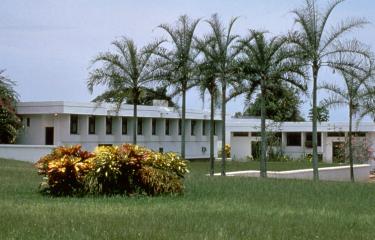The Agence française de développement (AFD) and ANRS | Maladies infectieuses émergentes, in partnership with the Institut Pasteur, IRD, and laboratories across 13 African countries, are launching the joint AFROSCREEN project. This project meets an urgent need for surveillance of the development of SARS-CoV-2 variants and other emerging pathogens by bolstering laboratory genomic sequencing capacity.
This Health in Common Initiative project furthers France’s contribution to the global response to the COVID-19 pandemic and is consistent with the G20 strategy, in close coordination with the African Union CDC (Centres for Disease Control).
Strengthening laboratory capacity and tracking patterns of spread
The €10 million program has two main objectives:
- to bolster the sequencing capacity of laboratories in 13 African countries - Benin, Burkina Faso, Cameroon, Côte d’Ivoire, Ghana, Guinea, Madagascar, Mali, Niger, Central African Republic, Democratic Republic of Congo, Senegal, and Togo.
- to monitor patterns of spread by combining this effort with the implementation of preventive measures to control and limit the circulation of variants.
It will run for a two-year period, and should make it possible to carry out approximately 34,000 sequences and 54,000 screening PCR tests, using 19 laboratories.
The importance of strengthening virology surveillance capacity in Africa
The COVID-19 pandemic has affected nearly 6 million people and nearly 150,000 deaths have been reported by the Africa CDC to date. These top-level data, however, mask a high level of heterogeneity between countries. It is difficult to determine whether these figures correctly reflect the epidemiological situation, as virology surveillance is still limited in Africa. To date, circulation of the known “Alpha,” “Beta,” and “Delta” variants has already been reported in some countries and, like all RNA viruses, SARS-CoV-2 will continue to mutate, which will have a decisive impact on the course of the epidemic. There is therefore a major need to put in place an effective surveillance and sequencing strategy. This will make it possible to track the development, spread, and clinical impact of variants in the population more closely, but also to adapt public health priorities on the basis of these findings.
This project complements and strengthens the Africa Pathogen Genomics Initiative set up by Africa CDC for variant surveillance on the continent, with close collaboration planned between the ANRS-IRD-Institut Pasteur consortium and the CDC.
In the long term, the program will consolidate technology platforms by developing a permanent surveillance network for emerging pathogens in Africa, thus taking a “One Health” approach.
AFROSCREEN: an international and interinstitutional consortium
AFROSCREEN demonstrates a resolute, committed approach, focusing on interinstitutional collaborations to tackle major scientific and societal challenges. The consortium represents a natural continuation of three projects implemented in 2020 as part of AFD’s “Health in Common” Initiative, which strengthened the diagnostic capacity of laboratories in several African countries. Based on these achievements, and promoting a concerted multi-partner approach, the new project is designed to strengthen their capacities in terms of variant detection and surveillance and public health.
AFD will provide €10 million euros in funding for the project, which will be run by ANRS | Maladies infectieuses émergentes, an independent Inserm agency. The international networks of 20 laboratories in 13 African countries constitute the project task force, in conjunction with the three French research partners: ANRS | Maladies infectieuses émergentes, the Institut Pasteur, and the IRD.
The following networks will thus combine forces:
- seven Pasteur Network sites in the Central African Republic, Côte d’Ivoire, Guinea, Senegal, Cameroon, Niger, and Madagascar
- six sites in partnership with the IRD in Togo, Democratic Republic of Congo, Guinea, Cameroon, Benin, and Ghana
- six sites in partnership with ANRS | Maladies infectieuses émergentes in Côte d’Ivoire, Mali, Senegal, and Burkina Faso
This consortium, the first between the three institutions and their laboratory networks, will provide extensive geographical coverage, strong delivery capacity, and technical and scientific expertise.
“In order to bring an end to the pandemic, it is necessary for all countries to have the tools to identify the emergence of new variants. AFROSCREEN is a pivotal project in the area of virology research and surveillance because one of its major components involves bolstering sequencing and training capacity. This consortium fits perfectly with the missions of the ANRS | Maladies infectieuses émergentes, which revolve around international and interinstitutional collaborations and combine the strengths of different actors working together”; Yazdan Yazdanpanah, director of ANRS | Maladies infectieuses émergentes.
As President Macron has said, we must “continue to come together and join with all our partners” to combat the spread of COVID-19 variants around the world. This is the objective of the AFROSCREEN project, developed in partnership with the IRD, ANRS, and Institut Pasteur—whose expertise and local presence should ensure its effectiveness—to boost variant surveillance in thirteen African countries. Funded through AFD’s Health in Common Initiative, this major project demonstrates France’s continued contribution to the global and above all African response to the pandemic, and is consistent with the G20 strategy, in close coordination with the African Union” Rémy Rioux, Chief Executive Officer of AFD.
This study is part of the priority scientific area Emerging infectious diseases of the Institut Pasteur's strategic plan for 2019-2023.





